KATHMANDU: Bhim Bahadur Tamang, 61, was found in Nakhkhu, Lalitpur in a pathetic condition.
Recently recovered from paralysis, he was taking hesitant steps with the aid of a stick.
During the festival, when journalists arrived to assess the situation of flood victims, they discovered Bhim Bahadur among squatters in the settlement, gazing at the remnants of his two-room tin house in the desolate area of the river banks.
The flood in the last week of September washed away 11 out of the 52 houses in Mangalfarm, including Bhim Bahadur’s home.
Flooding along the river was not uncommon; each year brought its share of inundation.
However, Bhim Bahadur stated he had never experienced such a devastating flood in his 61 years.
Along with his house, Bhim Bahadur’s therapy machine, crucial for his recovery, was also swept away.
“I had only bought the machine six months ago for Rs 300,000. I am heartbroken that I couldn’t save it,” he lamented.
This machine had enabled him, after two and a half years of being bedridden, to regain some mobility.
“That machine was provided to me by an organization. Who will help me now? If I don’t have it, what will happen to my health?”
Complaints about lack of relief
Bhim Bahadur, along with Thulimaya’s son Min Bahadur, 32, expressed their frustration about the relief efforts.
“A YouTuber gave me a sack of rice in the name of relief. Is it just YouTubers who come to help, or is there a government in this country? When will the government provide relief?”
They have heard rumors that the ward office will offer Rs 25,000 to each family, but uncertainty looms over when and if that assistance will materialize.
“Is Dashain only for the wealthy? Will we even have a chance to celebrate?”
Though they are living in a tent, Min insisted, “The festival is still ours. Doesn’t the state have a responsibility to create an environment for celebration?”
The biggest issue facing the community is sanitation.
Without toilets, victims are forced to defecate in the open. Min noted, “The ward has brought goods to set up temporary toilets, but they haven’t been installed yet.”
Open defecation has led to an increase in flies, raising health concerns. He urged the government to act quickly to prevent the spread of disease.
“There are 52 households here, with around 200 people. Ward No. 25 suffered the most damage compared to Wards 5, 10, and 15 of Nakhhu. Yet, relief has reached those areas while we are still waiting,” Min lamented.
Although there were no human casualties in their settlement, the physical damage was extensive.
“Water entered our homes, and many belongings were lost. While the bamboo houses were swept away, some iron structures remained. We don’t even have utensils to cook or clothes to wear.”
Federal MP Toshima Karki has arranged for a dozer to clear debris, but victims reported that they cannot use it unless they supply diesel themselves.
“Essential items like gas stoves, clothes, and cooking utensils are desperately needed,” Min added. “I’m wearing clothes given by others; I don’t have a single piece of my own.”
Victims also reported a rise in theft in the settlement. “Theft has increased even in this dire situation. Old belongings have been stolen, including mobile phones, bicycles, and money,” Min said.
Voices of the flood victims
Let’s hear from Bhim Bahadur, who shares the harrowing experience of the flood.
“It has been nine years since we settled in Mangalfarm. Floods used to occur in previous years, and we were confident it would be the same this time. But when the water reached waist height, panic set in.”
“My body doesn’t move. I also have diabetes and hypertension. The flood washed away important documents, three tolas of gold, and my medications. It’s exhausting to think about saving medicine and the therapy machine when I can’t save anything else.”
“My wife is nine years older than me. She couldn’t bear to leave a patient like me behind. For a moment, I thought we were destined to perish in the flood. As the water rose, unable to walk, we felt helpless.”
Unexpected floods and a life of struggle
When the water reached waist height, both of us elderly individuals couldn’t escape.
Others managed to rescue themselves, but how could someone with limited mobility like me get away? Water had been an issue before; floods typically didn’t rise above our knees.
“Having lived by the river, we thought we understood the risks of flooding. It’s a yearly occurrence, and we usually keep our belongings elevated and clean up once the waters recede. This year, however, we were told it would only be a minor flood. Instead, we faced an unexpected deluge that swept through our home,” he stated.
“I recall a major flood in Lalitpur in 2048. At that time, I lived in a slum in Jaulakhel with 19 friends.”
“Now, my left arm and leg cannot move. The therapy machine that once helped me walk with a cane has become my lifeline. I can’t walk much, just around the toilet and within the house with assistance.”
“After two and a half years of paralysis, I finally regained some movement, but my mouth remains crooked, making speech difficult. Now that I can communicate again, I feel joy when others listen to me.”
Seeking a better life
I drove in Kathmandu for 30 years and have a family of six—three daughters and one son. My eldest daughter is married, and the others are still at home.
My wife is my cousin’s daughter. Even though she is older than me, I married her because my mother insisted. In our culture, a daughter has certain obligations to her father’s family.
My home is Kavrepalanchowk. Among my four brothers, only one of my brothers in the mountains.
We have a garden there, but not much else. Life in the mountains has become difficult, prompting us to come to Kathmandu, where we hoped to find enough food. That land is now barren.
Thulimaya was born in Bhakunde, Lalitpur. Due to the tradition of marrying a cousin, she traveled from Lalitpur to Kavrepalanchok.
Despite the remote and mountainous terrain, the rule was clear: one must marry their uncle’s son.
After my grandmother and Saniya passed away, my mother insisted we move to Kathmandu.
We made the journey on foot in 2032. Back then, laborers earned six rupees for carrying heavy loads.
Celebrating Dashain with instant noodles
Now, we will celebrate Dashain by eating noodles. I’ve heard that the government plans to provide relief to flood victims, but it hasn’t arrived yet.
We are still waiting for assistance. A YouTuber brought us some relief, and a relative provided two sacks of rice, which has been our sustenance.
Looking at his son and wife, Bhim reflected on the situation, saying, “Dashain has come, but relief has not.” So, we will celebrate Dashain with noodles.
Memories of the 2015 earthquake
In my younger days, I drank heavily until I became ill. I would consume a whole jerkin of wine and three kilos of pork without having to share with anyone.
When the earthquake struck in 2015, I was indulging in alcohol and meat. It was a Saturday, and I didn’t even realize the earthquake had occurred until after it happened. Sometimes, you don’t notice the ground shaking beneath you.
Now, after getting sick, I can’t even think about alcohol. Eating has become difficult, especially tender meat. At my age, eating is a challenge, and I just hope to stay healthy.


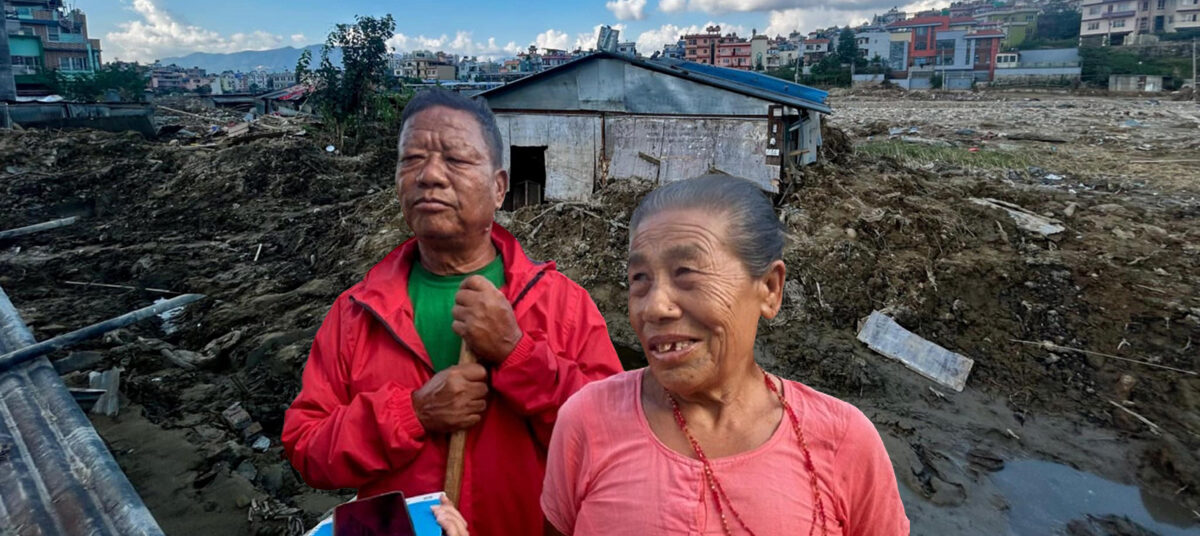
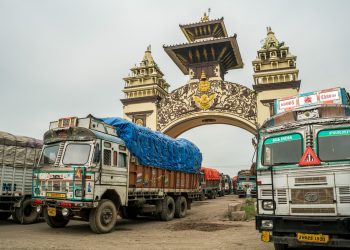
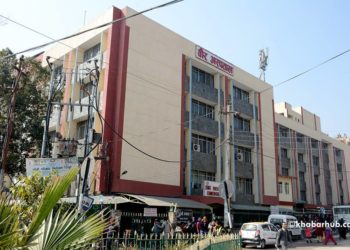

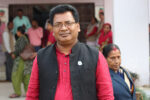
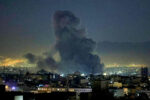

Comment